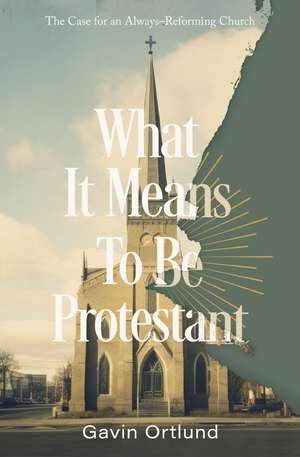What It Means to Be Protestant: The Case for an Always-Reforming Church
Autor Gavin Ortlunden Limba Engleză Paperback – 19 aug 2024
These days many evangelicals are exploring the more sacramental, liturgical, and historically-conscious church traditions, including Roman Catholicism and Eastern Orthodoxy. This hunger for historical rootedness is a welcome phenomenon--but unfortunately, many assume that this need can only be met outside of Protestant contexts.??
In What it Means to Be Protestant, Gavin Ortlund draws from both his scholarly work in church history and his personal experience in ecumenical engagement to offer a powerful defense of the Protestant tradition. Retrieving classical Protestant texts and arguments, he exposes how many of the contemporary objections leveled against Protestants are rooted in caricature. Ultimately, he shows that historic Protestantism offers the best pathway to catholicity and historical rootedness for Christians today.??
In his characteristically charitable and irenic style, Ortlund demonstrates that the 16th century Reformation represented a genuine renewal of the gospel. This does not entail that Protestantism is without faults. But because it is built upon the principle of semper reformanda (always reforming), Protestantism is capable of reforming itself according to Scripture as the ultimate authority. This scholarly and yet accessible book breaks new ground in ecumenical theology and will be a staple text in the field for many years to come.
Preț: 85.77 lei
Preț vechi: 107.60 lei
-20% Nou
16.41€ • 17.17$ • 13.63£
Carte disponibilă
Livrare economică 14-26 martie
Livrare express 26 februarie-04 martie pentru 45.82 lei
Specificații
ISBN-10: 0310156327
Pagini: 288
Dimensiuni: 139 x 213 x 17 mm
Greutate: 0.34 kg
Editura: ZONDERVAN
Colecția Zondervan
Locul publicării:Grand Rapids, United States
Descriere
These days many evangelicals are exploring the more sacramental, liturgical, and historically-conscious church traditions, including Roman Catholicism and Eastern Orthodoxy. This hunger for historical rootedness is a welcome phenomenon--but unfortunately, many assume that this need can only be met outside of Protestant contexts.??
In What it Means to Be Protestant, Gavin Ortlund draws from both his scholarly work in church history and his personal experience in ecumenical engagement to offer a powerful defense of the Protestant tradition. Retrieving classical Protestant texts and arguments, he exposes how many of the contemporary objections leveled against Protestants are rooted in caricature. Ultimately, he shows that historic Protestantism offers the best pathway to catholicity and historical rootedness for Christians today.??
In his characteristically charitable and irenic style, Ortlund demonstrates that the 16th century Reformation represented a genuine renewal of the gospel. This does not entail that Protestantism is without faults. But because it is built upon the principle of semper reformanda (always reforming), Protestantism is capable of reforming itself according to Scripture as the ultimate authority. This scholarly and yet accessible book breaks new ground in ecumenical theology and will be a staple text in the field for many years to come.
